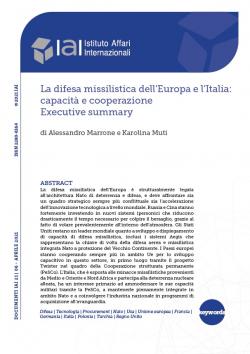La difesa missilistica dell'Europa e l'Italia: capacità e cooperazione. Executive summary
Europe’s missile defence is structurally linked to NATO deterrence and defence architecture, and it has to face both a worsened international security environment and an accelerating, worldwide technological innovation. Russia and China are heavily investing in new hypersonic systems which dramatically decrease the time needed to reach the target by flying mostly within the atmosphere. The US remains a global leader in the development and deployment of missile defence capabilities, including the Aegis systems which represent the cornerstone of NATO integrate air and missile defence covering the Old Continent. European countries are increasingly collaborating within the EU framework on the related capability development, primarily via the TWISTER project under the Permanent Structured Cooperation (PeSCo). Being exposed to missile threats from Middle East and North Africa and participating to allied nuclear sharing, Italy has a primary interest in upgrading its military capabilities through PeSCo, maintaining them fully integrated within NATO, and involving the national defence industry in cutting-edge procurement programmes.
This summary presents the main results of the study “Europe’s Missile Defence and Italy: Capabilities and Cooperation”, edited by Alessandro Marrone and Karolina Muti and published in Documenti IAI series.
-
Details
Rome, IAI, April 2021, 11 p. -
In:
-
Issue
21|06
Introduzione
L’importanza della difesa missilistica per l’Italia e l’Europa
L’innovazione tecnologica e il panorama industriale euro-atlantico
Capacità missilistiche al di fuori della Nato
La difesa missilistica dell’Europa: il ruolo della Nato e il contributo dell’Ue
Francia
Germania
Italia
Polonia
Turchia
Regno Unito
Stati Uniti
Trattati e regimi di controllo
Dieci punti chiave per la strategia dell’Italia
Topic
Tag
Related content
-
Publication05/04/2021
Europe's Missile Defence and Italy: Capabilities and Cooperation
leggi tutto -
Event15/03/2021
La difesa missilistica, l’Europa e l’Italia
leggi tutto



